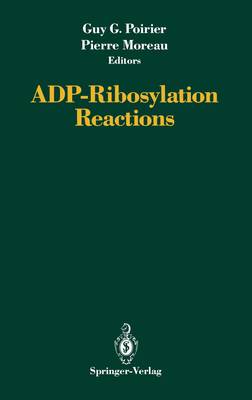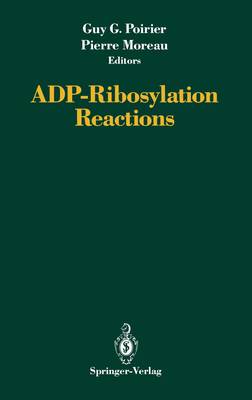
Bedankt voor het vertrouwen het afgelopen jaar! Om jou te bedanken bieden we GRATIS verzending (in België) aan op alles gedurende de hele maand januari.
- Afhalen na 1 uur in een winkel met voorraad
- In januari gratis thuislevering in België
- Ruim aanbod met 7 miljoen producten
Bedankt voor het vertrouwen het afgelopen jaar! Om jou te bedanken bieden we GRATIS verzending (in België) aan op alles gedurende de hele maand januari.
- Afhalen na 1 uur in een winkel met voorraad
- In januari gratis thuislevering in België
- Ruim aanbod met 7 miljoen producten
Zoeken
Omschrijving
1: Molecular Biology.- Structure and Function of the Human Poly(ADP-Ribose) Polymerase.- Cloning of Poly(ADP-Ribose) Polymerase cDNA from Lower Eukaryotes.- Molecular Biology of Human Nuclear NAD+: ADP-Ribosyl-transferase (Polymerizing).- Strategies for Studying the Functions of PADPRP Genes on Human Chromosomes 1 and 13.- Expression of the DNA-Binding Domain of Human Poly(ADP-Ribose) Polymerase as a Trans-Dominant Inhibitor of Poly(ADP-Ribosyl)ation in Transfected Eucaryotic Cell Lines.- Directed Mutagenesis of Glutamic Acid 988 of Poly(ADP-Ribose) Polymerase.- Chicken Poly(ADP-Ribose) Polymerase. Complete Protein Sequence Deduced from cDNA, Comparison with Mammalian Enzyme Sequences.- Nuclear Poly(ADPR) Polymerase Expression and Activity in Rat Astrocytes Culture: Effects of bFGF.- Molecular Cloning of the Rat Poly(ADP-Ribose) Polymerase Gene and Preliminary Characterization of its Promoter and 5'-Flanking Regions.- Structure and Organization of the Mouse pADPRT Gene.- Strategies for Expressing Analogs of PADPRP in Eukaryotic Cells.- Expression and Characterization of PADPRP and a Novel Glucocorticoid-PADPRP "Finger Swapped" Protein from Escherichia coil.- Tumor Promoters, But Not EGF, Increase Nuclear Poly(ADP-Ribose) Polymerase Gene Expression in Rat Hepatocytes Initiated in Utero with DMN and Cultured After Birth in Low-Calcium Synthetic Medium.- Expression of the Gene for Poly(ADP-Ribose) Polymerase and DNA Polymerase ß in Rat Tissues and in Proliferating Cells.- Expression of Poly(ADP-Ribose) Polymerase in Differentiating HL-60 Cells..- 2: Cancer, DNA Repair, and Metabolism.- A Novel Model of Enzymatic Repair of U.V.-Induced DNA Damage in Human Cells.- Poly(ADP-Ribose) Polymerase in Xenopus Laevis.- ADP-Ribosylation is Involved in the Integration of Exogenous DNA into the Mammalian Cell Genome, but is not Required for the Episomal Replication or Expression of Autonomously Replicating Plasmids.- Inhibitors of Poly(ADP-Ribose) Polymerase Block the Infection of Mammalian Cells by Retroviral Vectors.- Detection and Analysis of NAD Binding Proteins Including Poly(ADP-Ribose) Polymerase Immobilized on the Membrane.- An In Vitro Replication System for Autonomously Replicating Mammalian Origin-Enriched Sequences.- Variation in Poly(ADP-Ribose) Polymerase Activity and 2', 5'-Oligoadenylates Core Concentration in Estrogen-Stimulated Uterus and Liver of Immature and Adult Rats.- Possible Involvement of Poly(ADP-Ribose) Polymerase in the Brain Function.- Inhibition of Interferon-?-Dependent Induction of Major Histocompatibility Complex Class II Antigen by Expressing Exogenous Poly(ADP-Ribose) Synthetase Gene.- ADP-Ribose Polymers Bind Specifically and Non-covalently to Histones.- Poly(3'-deoxy ADP-ribosyl)ation of Proteins in Liver Chromatin Isolated from Rats Fed with Hepatocarcinogens.- ADP-Ribose Polymer Metabolism: Implications for Human Nutrition.- Some Aspects of Nuclear and Cytoplasmic ADP-ribosylation. Biological and Pharmacological Perspectives.- DNA Base Excision Repair Stimulates Poly(ADP-Ribose) Synthesis.- Studies on Poly(ADP-Ribosyl)ation in DNA Amplification and Mammalian Longevity.- DNA Topoisomerase I and Poly(ADP-Ribose) Polymerase in the Early Stages of Hepatocarcinogenesis.- Poly(ADP-Ribose) Polymerase Inhibitors Induce Murine Melanoma Cell Differentiation by a Mechanism Independent of Alterations in cAMP Levels and Protein Kinase A Activity.- Enhancement of Antimetabolite Cytoatoxicity by 3-Aminobenzamide in Chinese Hamster Ovary Cells is Independent of Poly(ADP-Ribose) Polymerase Inhibition.- Evidence for the Participation of Poly(ADP-Ribosyl)ation in Collagenase Gene Expression in Rabbit Synovial Fibroblasts after Treatment with Active Oxygen Released by Xantbin/Xanthinoxidase.- Enhancement of Oncogene-Mediated Transformation in Cloned Rat Embryo Fibroblast (CREF) Cells by 3-Anilnobenzamide.- Control of Procollagen Gene Transcription and Prolyl Hydroxylase Activity by Poly(ADP-Ribose).- Poly(ADP-Ribose) Synt
Specificaties
Betrokkenen
- Auteur(s):
- Uitgeverij:
Inhoud
- Aantal bladzijden:
- 452
- Taal:
- Engels
Eigenschappen
- Productcode (EAN):
- 9780387978222
- Verschijningsdatum:
- 14/05/1992
- Uitvoering:
- Hardcover
- Formaat:
- Genaaid
- Afmetingen:
- 156 mm x 234 mm
- Gewicht:
- 807 g

Alleen bij Standaard Boekhandel
+ 302 punten op je klantenkaart van Standaard Boekhandel
Beoordelingen
We publiceren alleen reviews die voldoen aan de voorwaarden voor reviews. Bekijk onze voorwaarden voor reviews.









